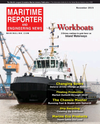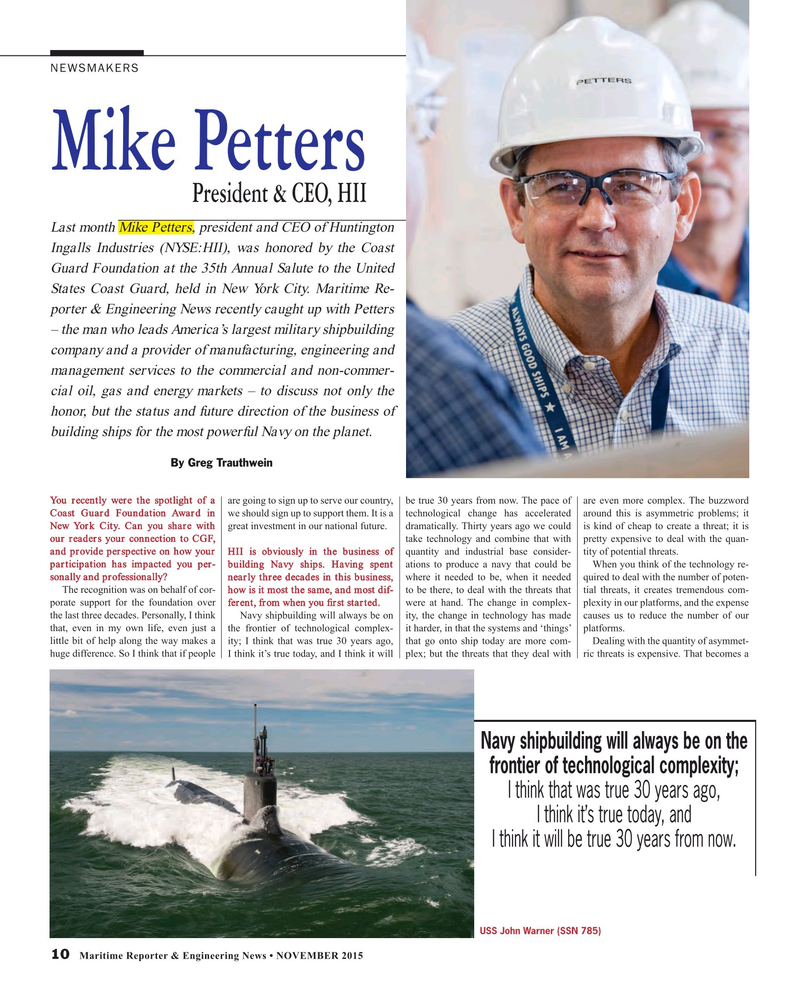
Page 10: of Maritime Reporter Magazine (November 2015)
Workboat Edition
Read this page in Pdf, Flash or Html5 edition of November 2015 Maritime Reporter Magazine
NEWSMAKERS
Mike Petters
President & CEO, HII
Last month Mike Petters, president and CEO of Huntington
Ingalls Industries (NYSE:HII), was honored by the Coast
Guard Foundation at the 35th Annual Salute to the United
States Coast Guard, held in New York City. Maritime Re- porter & Engineering News recently caught up with Petters – the man who leads America’s largest military shipbuilding company and a provider of manufacturing, engineering and management services to the commercial and non-commer- cial oil, gas and energy markets – to discuss not only the honor, but the status and future direction of the business of building ships for the most powerful Navy on the planet.
By Greg Trauthwein
You recently were the spotlight of a are going to sign up to serve our country, be true 30 years from now. The pace of are even more complex. The buzzword
Coast Guard Foundation Award in we should sign up to support them. It is a technological change has accelerated around this is asymmetric problems; it
New York City. Can you share with great investment in our national future. dramatically. Thirty years ago we could is kind of cheap to create a threat; it is our readers your connection to CGF, take technology and combine that with pretty expensive to deal with the quan- and provide perspective on how your HII is obviously in the business of quantity and industrial base consider- tity of potential threats. participation has impacted you per- building Navy ships. Having spent ations to produce a navy that could be When you think of the technology re- sonally and professionally? nearly three decades in this business, where it needed to be, when it needed quired to deal with the number of poten- The recognition was on behalf of cor- how is it most the same, and most dif- to be there, to deal with the threats that tial threats, it creates tremendous com- porate support for the foundation over ferent, from when you ? rst started. were at hand. The change in complex- plexity in our platforms, and the expense the last three decades. Personally, I think Navy shipbuilding will always be on ity, the change in technology has made causes us to reduce the number of our that, even in my own life, even just a the frontier of technological complex- it harder, in that the systems and ‘things’ platforms.
little bit of help along the way makes a ity; I think that was true 30 years ago, that go onto ship today are more com- Dealing with the quantity of asymmet- huge difference. So I think that if people I think it’s true today, and I think it will plex; but the threats that they deal with ric threats is expensive. That becomes a
Navy shipbuilding will always be on the frontier of technological complexity;
I think that was true 30 years ago,
I think it’s true today, and
I think it will be true 30 years from now.
USS John Warner (SSN 785) 10 Maritime Reporter & Engineering News • NOVEMBER 2015
MR #11 (10-17).indd 10 10/30/2015 10:17:26 AM

 9
9

 11
11
